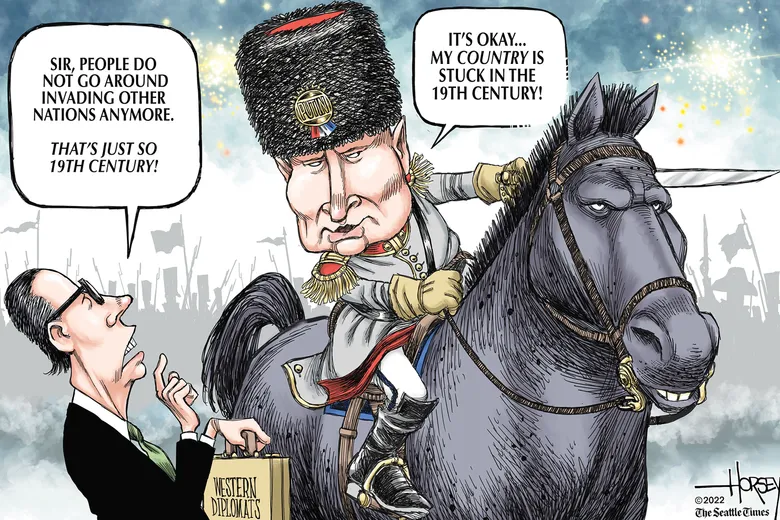Communism dominated Russia for 7 decades, its origins and demise

The Rus, dominated for 250 years by the Tartar invasion fought all invaders to set up a country in the vast Russian steppes ill defined by defensible rivers or mountains. Ivan the Terrible established authoritarian rule when it was vital for the very survival of the Russian state.
In 1839, French nobleman Marquis de Custine described Russia: the political state of Russia is a country in which the government says what it pleases, because it alone has the right to speak...André Gide in 1936 described: Stalin's effigy is everywhere, his name is on every tongue...Is it adoration, love or fear? There is nothing like a stay in the USSR to help us appreciate the inappreciable liberty of thought still enjoyed in France. Masha Gessen described Russia, in 2019, as a post-communist, mafia state.
The first two Tsars imposed order on society by means of the Russian Code of Laws which endured from 1649 to 1833. The Russian intelligentsia was an instrument of self destruction, its only purpose was revolution. Vissarian Belinsky, in 1847, emphasised the importance of the writer in Russian society, Russian literature was expected to carry a profound social message. Pushkin, Lermontov and Turenev describe a man of education unwilling to accept the harsh realities of Russian life. Herzen, Dobrolyubov, Pisarev, Cherneyshevskey were members of the intelligentsia who died young.
Peter the Great established Russia's modern history. Russia was a great European power during the time between the defeat of Napoleon and the disastrous Crimean War. M.M. Speransky, an able administrator, set up laws necessary for social change during the reign of Alexander I and Nicholas I.
The serfs had a similar history to that of Negro slaves in the United States.
The Decembrists, aristocratic military commanders, defied Nicholas I in favour of his elder brother Constantine and died in their droves December 14, 1825. Their revolt lived on in their memory as the first act of defiance against a Tsar. Dostoevsky commemorated the Decembrists in The Possessed.
Herzen influenced Russia from exile in Europe. Chernyshevsky, born 1828, wrote What is to be done? In 1863 in prison. This book became the bible of revolutionary idealism converting large numbers of young men and women to choose revolution as their vocation.
In February 1861 Tsar Alexander I signed the Emancipation of serfs Decree. In July 1863, US President Lincoln freed the slaves, the numbers of slaves/serfs were similar. Tremendous industrial development ensured Russia, in this time period became a Great Power. Mikhailov's and Zaichnevsky's prose were inflammatory, Zaichnevsky's in particular: 'anyone who is not with us then is against us, and enemies should be exterminated by every possible means, (paraphrased by George Dubya Bush, 'Axis of Evil' speech). Nechaev preached a gospel of revolt he was the focus of unending violent political controversy, his Programme of Revolutionary Action together with Tkachev, social revolution through political revolution is our only aim. Tkachev, born 1844, was the essential link between Cherneyshevsky and Lenin. Tkachev was arrested 1869 and was smuggled out of Russia 1873. Tkachev adhered to Marx's concept of economics in historical development. Tkachev corresponded acrimoniously with Engels, Marx's sponsor. Equally the Lavrov-Tkachev controversy marred Tkachev's reputation. Tkachev influenced Lenin yet Tkachev was relegated to history and remains unknown.
The Chigrin affair: 1876-7 whereby Stefanovich and Deutsch established themselves 200km from Kiev where the Tsar's Secret Imperial Charter urged agrarian to set up 'Secret Militias' for rebellion. This was a hoax , yet, it aided the Populists desire to organise the peasants. Russian revolutionaries were completely blinded by the Chigrin affair. The controversial three trials of 1877 inflamed the population. Agrarian disorders in Russia (1878-1882, 136 incidents) were exceeded by the Land War in Ireland (1878-1882, 11,624 incidents). Terrorism became the deliberate strategy of an organised political party with assassinations 'de rigeur'. Russia's constitutional bourgeois development was halted by this consistent anarchy.
Marx, never worked due to Engels, the industrialist, being prepared to sponsor him. Engels had a Irish wife who reminded him of England's destructive policies towards Ireland. The Communist Manifesto presaged the death of capitalism and turned out to be true, cf. 2008. Marx and Engels have had a profound influence on Russia from abroad which created a political and social system in Russia based on the cruel domination of dictators such a Stalin and currently Tsar Putin. Plekhanov, described as the father of 'Russian Marxism' he became the very embodiment of 'Orthodox Marxism.' Plekhanov's pamphlet 'Socialism and Political Struggle' emphasising his awareness of Russian reality.
'Grau, treuer Freud, ist alle Theorie Und grun des Lebens goldner Baum' - (All theory , dear friend, is grey, but the golden tree of life springs ever green.) Engels liked to quote Goethe.
Gorbachev admitted the Soviet Union had an economy the size of Belgium. The Soviet Union dependant on 62 million Gulag inmates (1934-1990) collapsed, the US won the Cold War. We now have a nefarious, threatening multi-polar world with a petulant twitter user in chief dictating public policy with alarming consequences.
Vladimiir Illyich Ulyanov arrived in St Petersburg 1893 to set up a law practice. His nom de plume, Lenin, was adopted later. He commenced his revolutionary activity almost immediately.
Source: The Russian Tradition, Tibor Szamuely, Fontana Press, 1988; Fear no Evil, Nathan Sharansky, Coronet Books, 1989

















